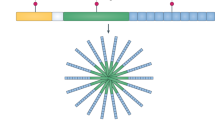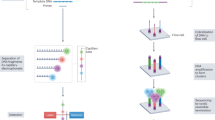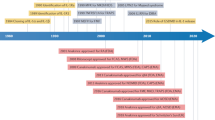Abstract
The term autoinflammation was initially coined to distinguish disorders characterized by recurrent episodes of inflammation in the absence of high-titer autoantibodies and antigen-specific T cells from the more common autoimmune diseases. Although this concept originally applied to monogenic hereditary recurrent fevers, it has expanded over time to include polygenic (complex) autoinflammatory diseases. Understanding of the pathogenesis of autoinflammatory diseases has grown rapidly in the past decade owing to advances in genome research and technology. Genome-wide linkage analysis, positional cloning, homozygosity mapping and candidate gene screening have led to the identification of mutations in 12 genes that are associated with monogenic diseases. Genome-wide association studies have begun to elucidate the molecular basis of complex autoinflammatory diseases. The discovery of disease-causing genetic variants has defined autoinflammation as disorder within the innate immune system, implicating IL-1 as a master cytokine, and has led to a breakthrough in therapy, with IL-1 inhibitors producing rapid and sustained amelioration of symptoms. Despite major advances, however, a substantial number of patients have no mutations in the known autoinflammatory genes. The challenge now is to find the undiscovered genes, considering that most cases are sporadic or occur within small families. New approaches and tools such as next-generation sequencing are discussed.
Key Points
-
A new nosology, autoinflammation, has been proposed to distinguish inherited diseases of the innate immune system from chronic inflammatory diseases that are mediated by the adaptive immune system
-
Most causal variants associated with systemic autoinflammatory diseases are missense nucleotide changes, a possible explanation for the intermittent nature of the inflammatory symptoms characteristic of these diseases
-
Mutations in the same protein have been associated with different phenotypes in human disease, and phenotypes associated with disease-causing mutations vary in animal models and human disease
-
Animal studies suggest that most causal variants of autoinflammatory diseases seem to be gain-of-function mutations, regardless of the mode of disease inheritance in humans
-
Many of the affected genes are directly or indirectly involved in the regulation of the IL-1 cytokine signaling pathway
-
Molecular insights have provided the basis for new therapeutic interventions that have had an immediate and dramatic impact on the treatment of autoinflammatory disorders
This is a preview of subscription content, access via your institution
Access options
Subscribe to this journal
Receive 12 print issues and online access
$209.00 per year
only $17.42 per issue
Buy this article
- Purchase on Springer Link
- Instant access to full article PDF
Prices may be subject to local taxes which are calculated during checkout





Similar content being viewed by others
References
McDermott, M. F. et al. Germline mutations in the extracellular domains of the 55 kDa TNF receptor, TNFR1, define a family of dominantly inherited autoinflammatory syndromes. Cell 97, 133–144 (1999).
Galon, J., Aksentijevich, I., McDermott, M. F., O'Shea, J. J. & Kastner, D. L. TNFRSF1A mutations and autoinflammatory syndromes. Curr. Opin. Immunol. 12, 479–486 (2000).
Masters, S. L., Simon, A., Aksentijevich, I. & Kastner, D. L. Horror autoinflammaticus: the molecular pathophysiology of autoinflammatory disease. Annu. Rev. Immunol. 27, 621–668 (2009).
The International FMF Consortium. Ancient missense mutations in a new member of the RoRet gene family are likely to cause familial Mediterranean fever. Cell 90, 797–807 (1997).
French FMF Consortium. A candidate gene for familial Mediterranean fever. Nat. Genet. 17, 25–31 (1997).
Drenth, J. P. et al. Mutations in the gene encoding mevalonate kinase cause hyper-IgD and periodic fever syndrome. International Hyper-IgD Study Group. Nat. Genet. 22, 178–181 (1999).
Houten, S. M. et al. Mutations in MVK, encoding mevalonate kinase, cause hyperimmunoglobulinaemia D and periodic fever syndrome. Nat. Genet. 22, 175–177 (1999).
Hoffman, H. M., Mueller, J. L., Broide, D. H., Wanderer, A. A. & Kolodner, R. D. Mutation of a new gene encoding a putative pyrin-like protein causes familial cold autoinflammatory syndrome and Muckle–Wells syndrome. Nat. Genet. 29, 301–305 (2001).
Ferguson, P. J. et al. Homozygous mutations in LPIN2 are responsible for the syndrome of chronic recurrent multifocal osteomyelitis and congenital dyserythropoietic anaemia (Majeed syndrome). J. Med. Genet. 42, 551–557 (2005).
Aksentijevich, I. et al. An autoinflammatory disease with deficiency of the interleukin-1-receptor antagonist. N. Engl. J. Med. 360, 2426–2437 (2009).
Reddy, S. et al. An autoinflammatory disease due to homozygous deletion of the IL1RN locus. N. Engl. J. Med. 360, 2438–2444 (2009).
Agarwal, A. K. et al. PSMB8 encoding the β5i proteasome subunit is mutated in joint contractures, muscle atrophy, microcytic anemia, and panniculitis-induced lipodystrophy syndrome. Am. J. Hum. Genet. 87, 866–872 (2010).
Jeru, I. et al. Mutations in NALP12 cause hereditary periodic fever syndromes. Proc. Natl Acad. Sci. USA 105, 1614–1619 (2008).
Remmers, E. F. et al. Genome-wide association study identifies variants in the MHC class I, IL10, and IL23R-IL12RB2 regions associated with Behcet's disease. Nat. Genet. 42, 698–702 (2010).
Mizuki, N. et al. Genome-wide association studies identify IL23R-IL12RB2 and IL10 as Behçet's disease susceptibility loci. Nat. Genet. 42, 703–706 (2010).
van der Hilst, J. C. et al. Long-term follow-up, clinical features, and quality of life in a series of 103 patients with hyperimmunoglobulinemia D syndrome. Medicine (Baltimore) 87, 301–310 (2008).
Samuels, J. et al. Familial Mediterranean fever at the millennium. Clinical spectrum, ancient mutations, and a survey of 100 American referrals to the National Institutes of Health. Medicine (Baltimore) 77, 268–297 (1998).
Naruto, T. et al. Hyper-IgD syndrome with novel mutation in a Japanese girl. Mod. Rheumatol. 19, 96–99 (2009).
Nisole, S., Stoye, J. P. & Saib, A. TRIM family proteins: retroviral restriction and antiviral defence. Nat. Rev. Microbiol. 3, 799–808 (2005).
Touitou, I. et al. Infevers: an evolving mutation database for auto-inflammatory syndromes. Hum. Mutat. 24, 194–198 (2004).
Institut de genetique humaine. Infevers: an online database for autoinflammatory mutations [online], (2010).
Touitou, I. et al. Country as the primary risk factor for renal amyloidosis in familial Mediterranean fever. Arthritis. Rheum. 56, 1706–1712 (2007).
Grateau, G. et al. Amyloidosis and auto-inflammatory syndromes. Curr. Drug Targets Inflamm. Allergy 4, 57–65 (2005).
Ben-Chetrit, E., Lerer, I., Malamud, E., Domingo, C. & Abeliovich, D. The E148Q mutation in the MEFV gene: is it a disease-causing mutation or a sequence variant? Hum. Mutat. 15, 385–386 (2000).
Ryan, J. G. et al. Clinical features and functional significance of the P369S/R408Q variant in pyrin, the familial Mediterranean fever protein. Ann. Rheum. Dis. 69, 1383–1388 (2010).
Marek-Yagel, D., Bar-Joseph, I., Pras, E. & Berkun, Y. Is E148Q a benign polymorphism or a disease-causing mutation? J. Rheumatol. 36, 2372 (2009).
Gershoni-Baruch, R., Brik, R., Shinawi, M. & Livneh, A. The differential contribution of MEFV mutant alleles to the clinical profile of familial Mediterranean fever. Eur. J. Hum. Genet. 10, 145–149 (2002).
Masters, S. L. et al. The SPRY domain of SSB-2 adopts a novel fold that presents conserved Par-4-binding residues. Nat. Struct. Mol. Biol. 13, 77–84 (2006).
Woo, J. S., Suh, H. Y., Park, S. Y. & Oh, B. H. Structural basis for protein recognition by B30.2/SPRY domains. Mol. Cell 24, 967–976 (2006).
Chae, J. J. et al. Gain-of-function pyrin mutations induce NLRP3 protein-independent interleukin-1β activation and severe autoinflammation in mice. Immunity 34, 755–768 (2011).
Marek-Yagel, D. et al. Clinical disease among patients heterozygous for familial Mediterranean fever. Arthritis Rheum. 60, 1862–1866 (2009).
Bootym M. G. et al. Familial Mediterranean fever with a single MEFV mutation: where is the second hit? Arthritis Rheum. 60, 1851–1861 (2009).
Mandey, S. H., Schneiders, M. S., Koster, J. & Waterham, H. R. Mutational spectrum and genotype-phenotype correlations in mevalonate kinase deficiency. Hum. Mutat. 27, 796–802 (2006).
Cuisset, L. et al. Molecular analysis of MVK mutations and enzymatic activity in hyper-IgD and periodic fever syndrome. Eur. J. Hum. Genet. 9, 260–266 (2001).
Houten, S. M., van Woerden, C. S., Wijburg, F. A., Wanders, R. J. & Waterham, H. R. Carrier frequency of the V377I (1129G>A) MVK mutation, associated with hyper-IgD and periodic fever syndrome, in the Netherlands. Eur. J. Hum. Genet. 11, 196–200 (2003).
Simon, A., Mariman, E. C., van der Meer, J. W. & Drenth, J. P. A founder effect in the hyperimmunoglobulinemia D and periodic fever syndrome. Am. J. Med. 114, 148–152 (2003).
Frenkel, J. et al. Lack of isoprenoid products raises ex vivo interleukin-1β secretion in hyperimmunoglobulinemia D and periodic fever syndrome. Arthritis Rheum. 46, 2794–2803 (2002).
Glocker, E. O. et al. Inflammatory bowel disease and mutations affecting the interleukin-10 receptor. N. Engl. J. Med. 361, 2033–2045 (2009).
Hull, K. M. et al. The TNF receptor-associated periodic syndrome (TRAPS): emerging concepts of an autoinflammatory disorder. Medicine (Baltimore) 81, 349–368 (2002).
Simon, A. et al. Concerted action of wild-type and mutant TNF receptors enhances inflammation in TNF receptor 1-associated periodic fever syndrome. Proc. Natl Acad. Sci. USA 107, 9801–9806 (2010).
Pelagatti, M. A. et al. Long-term clinical profile of children with the low-penetrance R92Q mutation of the TNFRSF1A gene. Arthritis Rheum. 63, 1141–1150 (2011).
Ravet, N. et al. Clinical significance of P46L and R92Q substitutions in the tumour necrosis factor superfamily 1A gene. Ann. Rheum. Dis. 65, 1158–1162 (2006).
Dowds, T. A., Masumoto, J., Zhu, L., Inohara, N. & Nunez, G. Cryopyrin-induced interleukin 1β secretion in monocytic cells: enhanced activity of disease-associated mutants and requirement for ASC. J. Biol. Chem. 279, 21924–21928 (2004).
Yu, J. W. et al. Cryopyrin and pyrin activate caspase-1, but not NF-κB, via ASC oligomerization. Cell Death Differ. 13, 236–249 (2006).
Hawkins, P. N., Bybee, A., Aganna, E. & McDermott, M. F. Response to anakinra in a de novo case of neonatal-onset multisystem inflammatory disease. Arthritis Rheum. 50, 2708–2709 (2004).
Goldbach-Mansky, R. et al. Neonatal-onset multisystem inflammatory disease responsive to interleukin-1β inhibition. N. Engl. J. Med 355, 581–592 (2006).
Aksentijevich, I. et al. The clinical continuum of cryopyrinopathies: novel CIAS1 mutations in North American patients and a new cryopyrin model. Arthritis Rheum. 56, 1273–1285 (2007).
Hawkins, P. N., Lachmann, H. J., Aganna, E. & McDermott, M. F. Spectrum of clinical features in Muckle–Wells syndrome and response to anakinra. Arthritis Rheum. 50, 607–612 (2004).
Porksen, G. et al. Periodic fever, mild arthralgias, and reversible moderate and severe organ inflammation associated with the V198M mutation in the CIAS1 gene in three German patients—-expanding phenotype of CIAS1 related autoinflammatory syndrome. Eur. J. Haematol. 73, 123–127 (2004).
Wise, C. A. et al. Mutations in CD2BP1 disrupt binding to PTP PEST and are responsible for PAPA syndrome, an autoinflammatory disorder. Hum. Mol. Genet. 11, 961–969 (2002).
Shoham, N. G. et al. Pyrin binds the PSTPIP1/CD2BP1 protein, defining familial Mediterranean fever and PAPA syndrome as disorders in the same pathway. Proc. Natl Acad. Sci. USA 100, 13501–13506 (2003).
Grosse, J. et al. Mutation of mouse Mayp/Pstpip2 causes a macrophage autoinflammatory disease. Blood 107, 3350–3358 (2006).
Chitu, V. et al. Primed innate immunity leads to autoinflammatory disease in PSTPIP2-deficient cmo mice. Blood 114, 2497–2505 (2009).
Hurtado-Nedelec, M. et al. Genetic susceptibility factors in a cohort of 38 patients with SAPHO syndrome: a study of PSTPIP2, NOD2, and LPIN2 genes. J. Rheumatol. 37, 401–409 (2010).
Miceli-Richard, C. et al. CARD15 mutations in Blau syndrome. Nat. Genet. 29, 19–20 (2001).
Kanazawa, N. et al. Early-onset sarcoidosis and CARD15 mutations with constitutive nuclear factor-κB activation: common genetic etiology with Blau syndrome. Blood 105, 1195–1197 (2005).
Albrecht, M., Lengauer, T. & Schreiber, S. Disease-associated variants in PYPAF1 and NOD2 result in similar alterations of conserved sequence. Bioinformatics 19, 2171–2175 (2003).
Borghini, S. et al. Clinical presentation and pathogenesis of cold-induced autoinflammatory disease in a family with recurrence of an NLRP12 mutation. Arthritis Rheum. 63, 830–839 (2011).
Green, E. D. & Guyer, M. S. Charting a course for genomic medicine from base pairs to bedside. Nature 470, 204–213 (2011).
The 1000 Genomes Project Consortium. A map of human genome variation from population-scale sequencing. Nature 28, 1061–1073 (2010).
Feldmann, J. et al. Chronic infantile neurological cutaneous and articular syndrome is caused by mutations in CIAS1, a gene highly expressed in polymorphonuclear cells and chondrocytes. Am. J. Hum. Genet. 71, 198–203 (2002).
Aksentijevich, I. et al. De novo CIAS1 mutations, cytokine activation, and evidence for genetic heterogeneity in patients with neonatal-onset multisystem inflammatory disease (NOMID): a new member of the expanding family of pyrin-associated autoinflammatory diseases. Arthritis Rheum. 46, 3340–3348 (2002).
Garg, A. et al. An autosomal recessive syndrome of joint contractures, muscular atrophy, microcytic anemia, and panniculitis-associated lipodystrophy. J. Clin. Endocrinol. Metab. 95, E58–E63 (2010).
Chan, F. K., Chun, H. J., Zheng, L., Siegel, R. M., Bui, K. L. & Lenardo, M. J. A domain in TNF receptors that mediates ligand-independent receptor assembly and signaling. Science 288, 2351–2354 (2000).
Banner, D.W. et al. Crystal structure of the soluble human 55 kd TNF receptor-human TNFβ complex: implications for TNF receptor activation. Cell 73, 431–445 (1993).
Saito, M. et al. Disease-associated CIAS1 mutations induce monocyte death, revealing low-level mosaicism in mutation-negative cryopyrin-associated periodic syndrome patients. Blood 111, 2132–2141 (2008).
Author information
Authors and Affiliations
Contributions
I. Aksentijevich researched data for the article, and I. Aksentijevich and D. L. Kastner contributed equally to discussing content, writing the article, and reviewing/editing of the manuscript before submission.
Corresponding author
Ethics declarations
Competing interests
The authors declare no competing financial interests.
Rights and permissions
About this article
Cite this article
Aksentijevich, I., Kastner, D. Genetics of monogenic autoinflammatory diseases: past successes, future challenges. Nat Rev Rheumatol 7, 469–478 (2011). https://doi.org/10.1038/nrrheum.2011.94
Published:
Issue Date:
DOI: https://doi.org/10.1038/nrrheum.2011.94
This article is cited by
-
Familial Mediterranean fever-related miR-197-3p targets IL1R1 gene and modulates inflammation in monocytes and synovial fibroblasts
Scientific Reports (2021)
-
Consensus protocols for the diagnosis and management of the hereditary autoinflammatory syndromes CAPS, TRAPS and MKD/HIDS: a German PRO-KIND initiative
Pediatric Rheumatology (2020)
-
SUMO-mediated regulation of NLRP3 modulates inflammasome activity
Nature Communications (2018)
-
A Comprehensive Overview of the Hereditary Periodic Fever Syndromes
Clinical Reviews in Allergy & Immunology (2018)
-
Dysfunctional immunoproteasomes in autoinflammatory diseases
Inflammation and Regeneration (2016)



